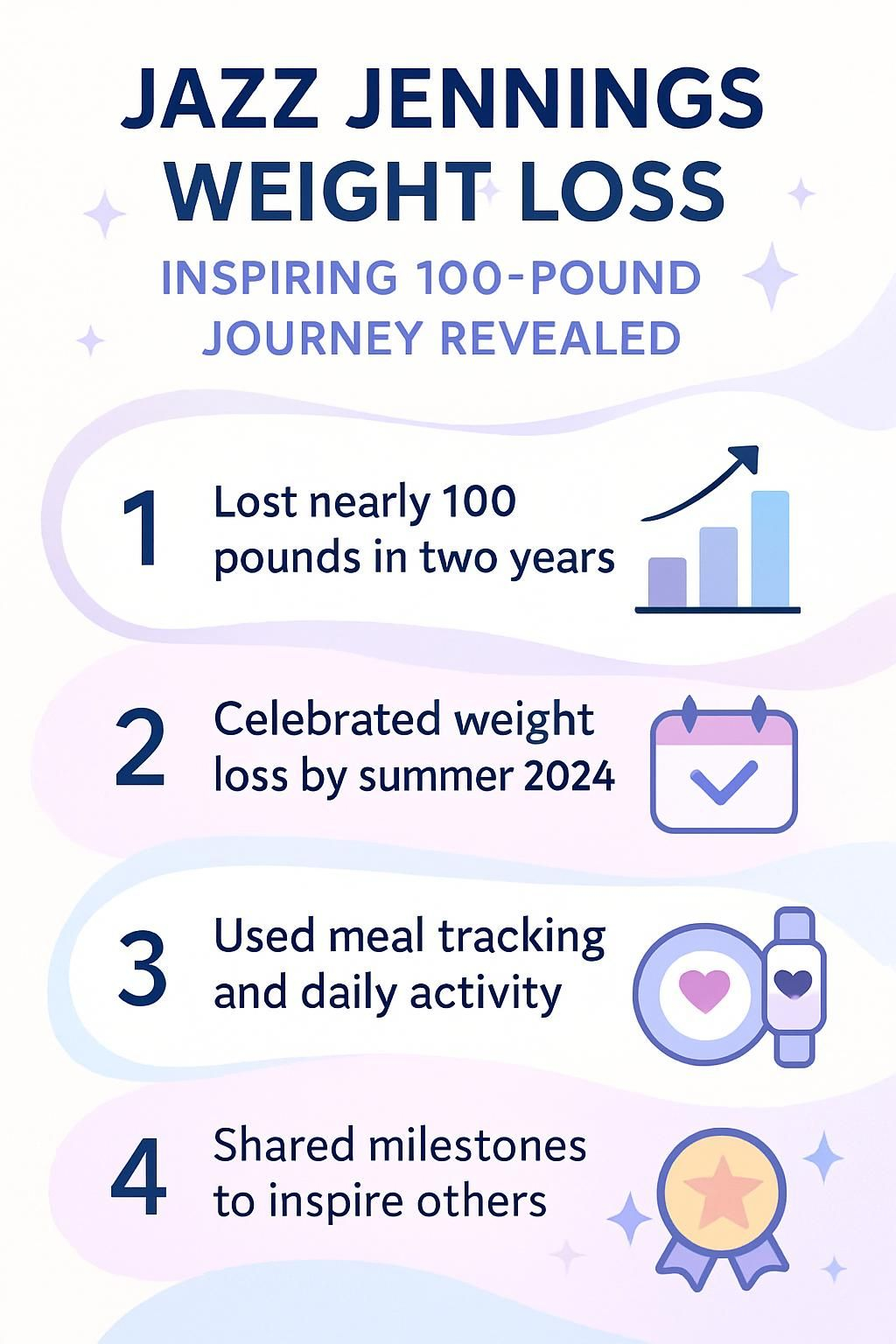Jazz Jennings Weight Loss: Inspiring 100-Pound Journey Revealed
Our Nutrition Assistant AI Suite will transform your body. You will lose fat, get toned, and build muscle. Gain confidence and optimal health.
If you feel stuck with weight gain, stories of real change can spark action. Jazz Jennings, known from I Am Jazz, shared a 100-pound weight loss journey after battling binge-eating disorder. Her path shows how treatment, steady habits, and support can help you rebuild health.
In this guide, you will see how Jazz reshaped daily routines, stayed accountable, and leaned on experts and family. You will also find simple steps you can adapt to your own plan. The goal is progress, not perfection.
Key Takeaways
- Jazz Jennings reported losing nearly 100 pounds in under two years while talking openly about binge-eating disorder on I Am Jazz and Instagram.
- A care team, including doctors, dietitians, and therapists, created a plan with nutrition, movement, mental health care, and regular check-ins.
- Healthy meal tracking, daily movement such as walking and Zumba, and strong family support helped her celebrate major milestones by summer 2024.
- Posting wins and setbacks online increased accountability and encouraged others with eating struggles to seek professional help and build support.
- Focusing on self-care and mental wellness improved her health while reinforcing body positivity and self-respect at every stage.

Jazz Jennings’ Weight Gain and Health Struggles

Public life can amplify stress, and stress can fuel unhelpful eating patterns. Star Jazz Jennings said she gained almost 100 pounds in less than two years. The main driver was binge-eating disorder, a condition that can affect both mood and physical health.
What is binge-eating disorder and how did it affect Jazz?
Binge-eating disorder is a mental health condition marked by repeated episodes of eating large amounts of food quickly, often without hunger. People can feel a loss of control during episodes, then guilt or shame afterward. According to the National Eating Disorders Association, treatment often includes therapy, nutrition support, and medical care [1].
Jazz shared that stress and emotions increased urges to eat, which led to constant overeating. The result was rapid weight gain, lower energy, and a harder time with daily tasks. She also spoke about feeling trapped in habits she wanted to change.
How did Jazz gain nearly 100 pounds in two years?
Several factors built on each other. Emotional stress, public pressure, and an increased appetite made portion control difficult. Unplanned meals and frequent snacking created a cycle that was hard to break. Over time, the pattern became more frequent, which sped up weight gain.
Hitting a personal low pushed Jazz to seek structured help. That turning point led to a new plan that focused on health, not quick fixes.
“My binge-eating disorder coupled with an increased appetite I experience has caused me to gain almost 100 lbs in a little less than 2 years,” shared Jazz on social media.
The Decision to Transform
Turning points often arrive quietly, then grow stronger with action.
When did Jazz take the first step toward weight loss?
In early 2022, Jazz shared a photo and said she was taking the first steps to care for her mind and body. She chose accountability and asked for support. That decision set a clear direction and made future milestones possible.
As updates continued, she reported steady progress and greater confidence. The focus stayed on daily choices that could be repeated, even on hard days.
How did Jazz change her mindset toward health and well-being?
Jazz reframed weight loss as a form of self-care. The goal shifted from punishment to energy, strength, and peace of mind. Sharing progress publicly helped her stay consistent while normalizing setbacks.
She often mentioned pride in progress while admitting she still had room to grow. That mix of honesty and hope is powerful. Small wins built momentum and kept motivation alive.
The Weight Loss Journey
Healthy change works best like a staircase, one step at a time.
How did Jazz create a balanced diet plan?
A balanced plan starts with awareness and support. Jazz worked with professionals and tracked meals to learn patterns. Structure helped her make steady choices without feeling deprived.
- Track daily intake to spot habits. Food logs highlight triggers and help guide adjustments.
- Work with a registered dietitian and medical team, especially if you struggle with binge-eating disorder or polyphagia, which means extreme hunger.
- Set clear nutrition targets. Center meals on lean protein, whole grains, vegetables, fruit, and healthy fats.
- Limit highly processed foods and sugary drinks. Choose water and nutrient-dense snacks most of the time.
- Plan meals and snacks in advance. Prep reduces last-minute choices and cuts cravings.
- Allow planned flexibility. An occasional treat can reduce feelings of restriction and prevent rebound overeating.
- Use your support network. Ask family or friends to join you in cooking, shopping, or planning.
- Check your mindset weekly. Reflect on stress, sleep, and mood because they affect eating choices.
- Reward progress without food. New workout gear or a fun activity can mark a milestone.
- Share updates with trusted people or a private group. Accountability helps consistency.
Helpful data points
- Plate method: fill half your plate with vegetables, one quarter with protein, and one quarter with whole grains.
- Protein guideline: many people aim for about 20 to 30 grams of protein per main meal.
- Fiber goal: 25 to 30 grams per day supports fullness and digestion.
These are general guides. Your needs may differ based on medical history and activity level.
What exercise routine did Jazz follow?
Movement started simple and grew with fitness. Variety reduced boredom and protected joints.
- Daily walking with step goals, increased gradually.
- Low-impact cardio, such as swimming or cycling, for heart health and calorie burn.
- Strength training two to three days per week to maintain muscle during weight loss.
- Group classes like Zumba to add fun and social support.
- Yoga and stretching for flexibility and stress relief, which can reduce emotional eating.
- Slow, steady increases in time or intensity to avoid injury.
- Basic tracking of workouts and goals to see progress over time.
The Centers for Disease Control and Prevention suggests at least 150 minutes of moderate aerobic activity per week plus two days of muscle strengthening for adults [2]. Adjust based on your doctor’s advice and your starting fitness.
How did health professionals support Jazz’s journey?
Jazz worked with doctors, a dietitian, and a therapist. Medical visits monitored labs, medications, and overall health. The dietitian turned goals into simple meals. Therapy addressed urges, coping skills, and stress.
This team approach blended evidence-based care with day-to-day coaching. Regular check-ins kept the plan safe and adaptable. It also provided encouragement when progress felt slow.
Milestones Along the Way
Milestones are like trail markers, they show you the path is working.
What was significant about Jazz reaching a 70-pound weight loss?
Dropping the first 70 pounds showed that consistent habits can create real change. Benefits often include easier movement, lower blood pressure, and improved mood. Reaching that point also proved her system was repeatable.
Sharing the update gave others hope and accountability. It is easier to keep going when you can see progress and feel it in daily life.
How did Jazz celebrate losing nearly 100 pounds by summer 2024?
Jazz marked the moment with joy and gratitude. She shared new photos, thanked her family, and noted there was still work ahead. The focus stayed on health, steady habits, and mental well-being.
Celebrating reinforced the idea that transformation comes from small, repeated choices. You can honor your wins without slipping back into old patterns.
Support System and Motivation
Support acts like a safety net, it catches you during hard weeks.
How did family and friends encourage Jazz?
Her close circle checked in, listened, and kept meals at home supportive. Friends joined walks and classes, which made activity more enjoyable. Encouragement focused on effort and consistency, not just the scale.
That environment reduced shame and pressure. It also made the healthy choice the easy choice.
How did Jazz use social media to stay accountable?
Posting meal ideas, workout clips, and honest reflections created public accountability. Comments offered support while the act of sharing reinforced commitment. Over time, updates became a record of growth that inspired others.
If public posting feels stressful, consider a private journal or a small group chat. The goal is consistent reflection, not perfection.
Overcoming Challenges
Every plan faces bumps; how you respond makes the difference.
How did Jazz battle food addiction?
Jazz treated binge-eating disorder as a health problem that needs care, not willpower alone. Structured meals, planned snacks, and trigger tracking reduced impulsive eating. Therapy sessions built coping skills for stress and strong cravings.
A supportive home setup helped, such as keeping nourishing foods handy and high-calorie items out of sight. Small, frequent wins restored confidence. Evidence supports this approach, which blends therapy with nutrition and medical care [1].
What strategies helped Jazz maintain consistency in lifestyle changes?
Consistency comes from systems you can repeat on busy days. Jazz leaned on routines and feedback.
- Weekly meal planning and food tracking to reduce guesswork.
- Small, specific goals that build momentum.
- Regular visits with her care team for guidance and adjustments.
- Daily walks and scheduled workouts to anchor the day.
- Encouragement from family and friends focused on effort.
- Accountability through updates and honest reflection.
- Mindfulness, sleep, and stress care to reduce triggers.
- Celebrating non-scale wins like energy, mobility, and mood.
- Journaling progress, barriers, and ideas for next week.
These habits keep you moving even when motivation dips. Systems carry you until motivation returns.
The Role of Mental Health
Healthy minds support healthy bodies, especially during change.
How did Jazz address emotional eating?
Jazz learned to spot triggers such as stress, boredom, or conflict. She used a feelings-and-food journal to connect mood with eating. Replacing automatic snacking with a short walk, a glass of water, or a call to a friend broke the pattern.
Therapy added tools like urge surfing, which means riding out a craving for a few minutes until it fades. Over time, those tools made tough moments manageable.
Why is self-care and mental well-being important for weight loss?
Stress can raise cortisol, a hormone that may increase cravings and belly fat. Good sleep, supportive relationships, and coping skills improve your ability to make steady choices. That stability makes nutrition and exercise easier to follow day after day.
Self-care is not a luxury. It is the base of a plan that lasts.
Advocating for Body Positivity
Body respect and progress can live side by side.
How does Jazz promote confidence at every stage?
She shares updates that include both highlights and hard days. That honesty teaches you to value effort, not only outcomes. Celebrating small wins builds confidence without waiting for a final number.
Her message: care for your body today, and keep showing up tomorrow.
What advice does Jazz give about self-love and acceptance?
Accept yourself at your current stage. Growth takes time, and patience protects your mental health. Surround yourself with people who support your goals and speak to yourself with kindness.
Forgive missteps, then return to your plan at the next meal or the next morning. One choice rarely defines your week.
Jazz Jennings Today
Steady habits can turn into a new normal.
How is Jazz feeling happier, healthier, and more motivated?
Reports of higher energy, better sleep, and more joy at daily movement followed her consistent routine. Balanced meals improved how her body felt, and regular activity lifted mood. Tracking progress made the results visible.
Support from loved ones and her audience added momentum. Those layers, repeated often, kept her on track.
In what ways is Jazz inspiring others with her transformation?
Sharing both struggles and solutions helps people feel less alone. Her story shows that a 100-pound weight loss can come from small, repeatable steps. Clear goals, treatment for binge-eating disorder, and steady support make change realistic.
If you want to start, begin with one habit this week and ask for help early. Progress grows from there.
Conclusion
Jazz Jennings shows that change is possible through steady habits, mental health care, and a strong support system. Her weight loss journey highlights simple tools you can use, such as meal planning, daily movement, and honest accountability. If you are struggling with eating concerns or medical issues, seek guidance from licensed professionals.
Health information here is for education and does not replace medical advice. If you suspect an eating disorder, contact a qualified clinician or reach out to the National Eating Disorders Association Helpline. Sources: [1] National Eating Disorders Association, Binge-Eating Disorder overview; [2] Centers for Disease Control and Prevention, Physical Activity Guidelines for adults.
FAQs
1. What positive changes did Jazz Jennings notice regarding her health during her weight loss journey?
Jazz Jennings reported many positive changes when it comes to her health, including improved energy levels and better emotional well-being. Her commitment led to a healthier lifestyle.
2. How much weight did Jazz Jennings lose, and what impact did this have on her daily life?
Jazz lost 100 pounds; this significant change allowed for greater mobility and increased confidence in daily activities. She shared that these improvements made a meaningful difference in how she felt each day.
3. What strategies contributed most to the positive changes when it comes to Jazz’s health?
Structured nutrition plans, regular physical activity, and support from family played key roles in achieving these positive changes when it comes to overall wellness.
4. Can others expect similar results by following Jazz Jennings’ approach?
Results vary based on individual factors such as starting point, medical conditions, and personal dedication. However, making consistent healthy choices can lead to positive changes when it comes to anyone’s health over time.
Summary:
Jazz Jennings’ inspiring story highlights the importance of persistence and support systems for lasting weight loss success. Positive changes when it comes to both physical and mental health are possible with steady effort and informed decisions backed by credible sources like healthcare professionals or registered dietitians.







